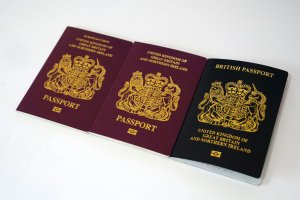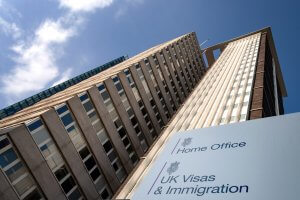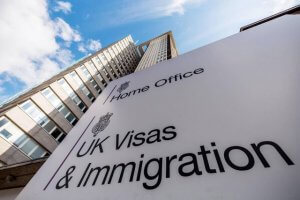- Business Immigration
- Immigration

Longer Reads
Demystifying the new UK visa rules
Our Immigration team share their thoughts on these new rules and their impact on businesses and multinational families.
2 minute read
Published 20 December 2023
Key information
- Specialisms
- Business
- Private Wealth
- Services
- Business Immigration
- Immigration
The Home Secretary has recently announced plans to cut migration levels and limit what he sees as the abuse of the immigration system. The intention is that this will reduce the number of people moving to the UK by around 300,000 a year.
The main reforms are outlined below and are set to take effect in Spring 2024.
- Increase in the minimum salary threshold for the Skilled Worker visa
The general salary threshold for sponsoring a Skilled Worker will be raised by over 50% from £26,200 to £38,700. Health and Care Worker visa are exempt from this increase. The change is expected to have a significant impact on those looking to sponsor overseas workers within the hospitality, retail, and construction sectors.
Health and Care visas and occupations on national pay scales (e.g. teachers) will be ‘exempt’ from this increase, however it is not yet clear whether the current threshold of £20,960 will remain in place or be lifted.
- Increase in the minimum salary threshold for family visas
The minimum salary under the family visa route will be increased from £18,600 to £38,700, more than doubling the current threshold.
The change is apparently justified since the current threshold has not increased for over a decade and apparently no longer reflects the income required to sustain a couple without relying on public funds.
Crucially, the minimum income requirement can still be met through savings – either in addition to a lower income or used exclusively – although it remains to be seen whether the savings threshold will be raised by a similar amount.
- Reforms to the Health and Care Worker visa, including care workers dependants
One of the most controversial new measures involves two significant changes to the Health and Care Worker visa.
Firstly, the Government will prevent overseas care workers bringing family members to the UK. This marks a stark change from the 120,000 dependants who came to the UK via this route in the last year alone.
Secondly, social care firms in England will be regulated by the Care Quality Commission in order to sponsor non-UK workers. This change is aimed at ensuring that only legitimate care home businesses are sponsoring care workers, following claims of bogus businesses abusing the system.
- End to salary discount for jobs on the ‘Shortage Occupation Industries’
The Government plans to end the 20% salary discount for shortage occupations, as recommended by the independent Migration Advisory Committee. The Shortage Occupation List (SOL) will be reformed into a smaller Immigration Salary List (ISL) to continue allowing industry shortages to be met by overseas workers in the short term.
- A review will be launched into the Graduate visa route to prevent perceived abuse
The Government views the Graduate visa route is as a useful tool “to allow the best and brightest to come to the UK”, issuing over 100,000 Graduate visas last year alone. However, there have been concerns of abuse, and the Migration Advisory Committee has been enlisted to review the route to suggest ways to protect the integrity and quality of UK higher education.
Comment
These announcements signify a significant shift in UK immigration, aiming to prioritise the domestic workforce and to limit the current record levels of legal migration.
However, some of these changes seem unnecessarily wide-ranging. The vast majority of current eligible Skilled Worker occupations have salary thresholds below the proposed new £38,700 level, whilst the similar salary increase in the family visa route will adversely affect British nationals who would reasonably expect to be able to move to the UK with their families.
Further details from the Government will be eagerly awaited in the new year, but the current rules will continue to apply in the meantime. Businesses looking to hire non-UK workers, or families planning to move to the UK, are encouraged to prioritise their applications before the changes take effect.
For further guidance on the topic please contact our Head of Immigration Charles Avens or Partner Charlie Fowler.
Related content
Longer Reads
Demystifying the new UK visa rules
Our Immigration team share their thoughts on these new rules and their impact on businesses and multinational families.
Published 20 December 2023
Associated sectors / services
Authors
The Home Secretary has recently announced plans to cut migration levels and limit what he sees as the abuse of the immigration system. The intention is that this will reduce the number of people moving to the UK by around 300,000 a year.
The main reforms are outlined below and are set to take effect in Spring 2024.
- Increase in the minimum salary threshold for the Skilled Worker visa
The general salary threshold for sponsoring a Skilled Worker will be raised by over 50% from £26,200 to £38,700. Health and Care Worker visa are exempt from this increase. The change is expected to have a significant impact on those looking to sponsor overseas workers within the hospitality, retail, and construction sectors.
Health and Care visas and occupations on national pay scales (e.g. teachers) will be ‘exempt’ from this increase, however it is not yet clear whether the current threshold of £20,960 will remain in place or be lifted.
- Increase in the minimum salary threshold for family visas
The minimum salary under the family visa route will be increased from £18,600 to £38,700, more than doubling the current threshold.
The change is apparently justified since the current threshold has not increased for over a decade and apparently no longer reflects the income required to sustain a couple without relying on public funds.
Crucially, the minimum income requirement can still be met through savings – either in addition to a lower income or used exclusively – although it remains to be seen whether the savings threshold will be raised by a similar amount.
- Reforms to the Health and Care Worker visa, including care workers dependants
One of the most controversial new measures involves two significant changes to the Health and Care Worker visa.
Firstly, the Government will prevent overseas care workers bringing family members to the UK. This marks a stark change from the 120,000 dependants who came to the UK via this route in the last year alone.
Secondly, social care firms in England will be regulated by the Care Quality Commission in order to sponsor non-UK workers. This change is aimed at ensuring that only legitimate care home businesses are sponsoring care workers, following claims of bogus businesses abusing the system.
- End to salary discount for jobs on the ‘Shortage Occupation Industries’
The Government plans to end the 20% salary discount for shortage occupations, as recommended by the independent Migration Advisory Committee. The Shortage Occupation List (SOL) will be reformed into a smaller Immigration Salary List (ISL) to continue allowing industry shortages to be met by overseas workers in the short term.
- A review will be launched into the Graduate visa route to prevent perceived abuse
The Government views the Graduate visa route is as a useful tool “to allow the best and brightest to come to the UK”, issuing over 100,000 Graduate visas last year alone. However, there have been concerns of abuse, and the Migration Advisory Committee has been enlisted to review the route to suggest ways to protect the integrity and quality of UK higher education.
Comment
These announcements signify a significant shift in UK immigration, aiming to prioritise the domestic workforce and to limit the current record levels of legal migration.
However, some of these changes seem unnecessarily wide-ranging. The vast majority of current eligible Skilled Worker occupations have salary thresholds below the proposed new £38,700 level, whilst the similar salary increase in the family visa route will adversely affect British nationals who would reasonably expect to be able to move to the UK with their families.
Further details from the Government will be eagerly awaited in the new year, but the current rules will continue to apply in the meantime. Businesses looking to hire non-UK workers, or families planning to move to the UK, are encouraged to prioritise their applications before the changes take effect.
For further guidance on the topic please contact our Head of Immigration Charles Avens or Partner Charlie Fowler.
Associated sectors / services
- Business Immigration
- Immigration
Authors
Need some more information? Make an enquiry below.
Subscribe
Please add your details and your areas of interest below
Article contributors
Charles
AvensPartner - Head of Immigration
Specialising in ImmigrationAbbie
ArmstrongAssociate
Specialising in Employment law for employees, Employment law for employers and Immigration
Enjoy reading our articles? why not subscribe to notifications so you’ll never miss one?
Subscribe to our articlesMessage us on WhatsApp (calling not available)
Please note that Collyer Bristow provides this service during office hours for general information and enquiries only and that no legal or other professional advice will be provided over the WhatsApp platform. Please also note that if you choose to use this platform your personal data is likely to be processed outside the UK and EEA, including in the US. Appropriate legal or other professional opinion should be taken before taking or omitting to take any action in respect of any specific problem. Collyer Bristow LLP accepts no liability for any loss or damage which may arise from reliance on information provided. All information will be deleted immediately upon completion of a conversation.
Close
















































